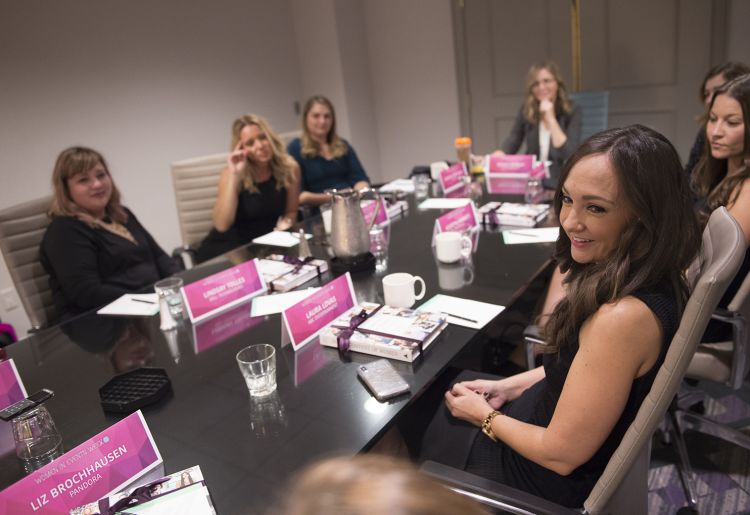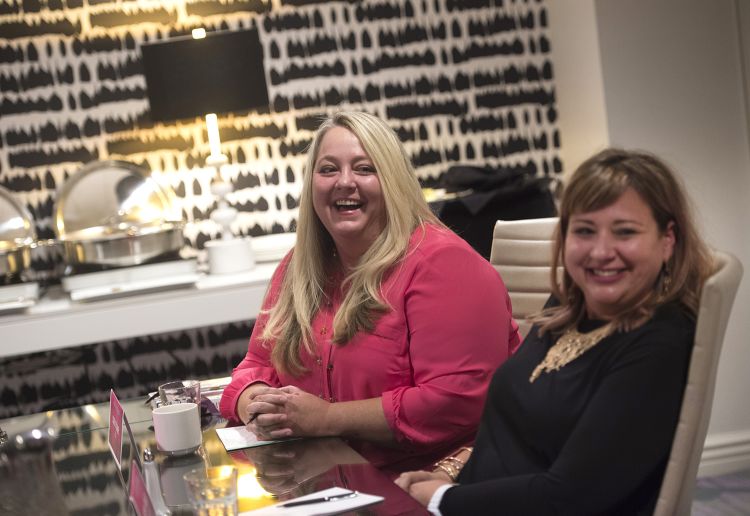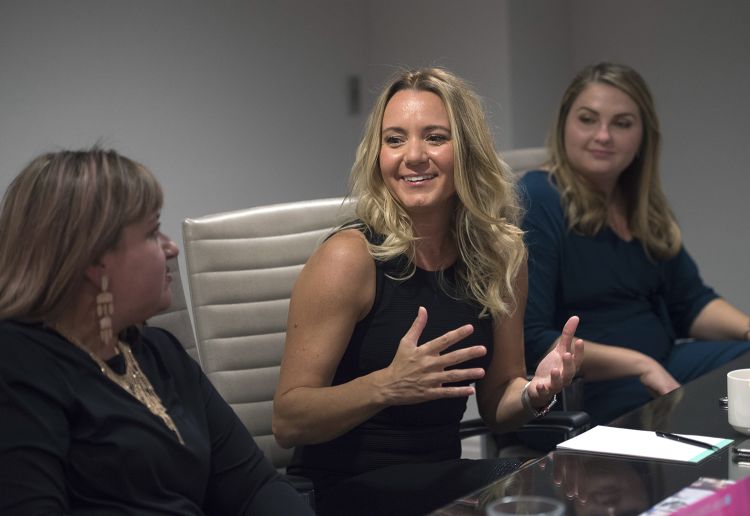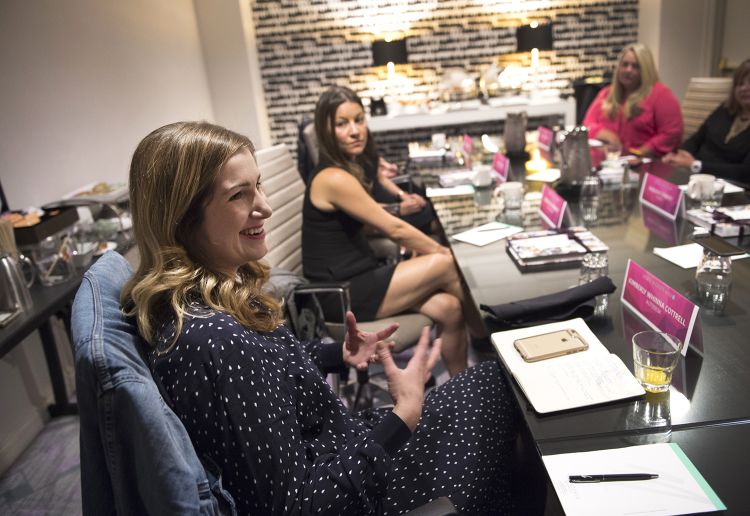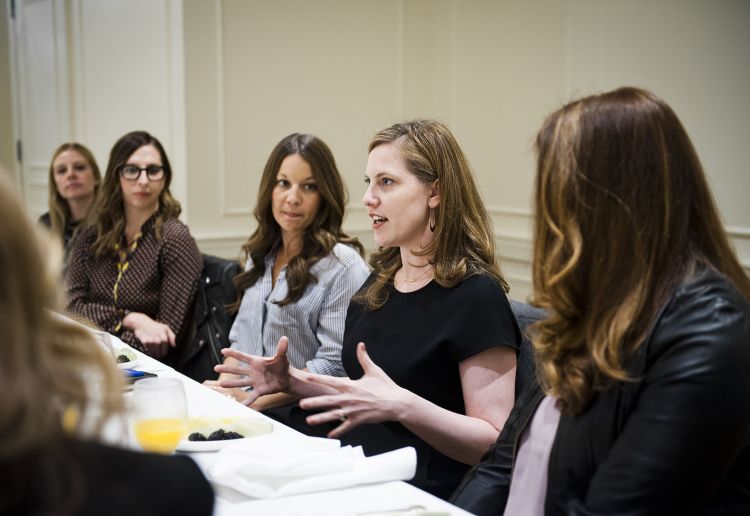WOMEN IN EVENTS
In our biggest special report ever, we present the industry’s brightest minds and take you inside closed-door roundtable discussions spanning exclusive insights on building a career, boosting confidence and embracing the women’s movement

We know it’s cliché to say, “You’ve come a long way, baby,” but, women in events—you’ve come a long way.
Fifty years ago, the only role women had in events was sitting on top of a car at the annual auto show. No exaggeration: working women in the event industry were literally car ornaments. In the ’60s and ’70s, you could find the women in this industry planning beautiful and flawless business events that, no doubt, helped their male bosses close sales and look really, really good.
Flash forward to about 20 years ago and finally—finally!—experiential marketing as a discipline started being taken more seriously, slowly but surely bringing the women who were quietly running events behind the scenes along with it. Fifteen years ago, we didn’t see as many women as men taking the stage to accept our annual industry awards as we knew were working to create them. And then that started to change, too.
Today, we see as many women as men running events, producing events, leading their brand and agency teams and—best of all—finding their rightful place at the top of the org chart or in the c-suite where their many talents can be acknowledged and respected. As one of this year’s Women in Events said, “It’s an exciting time to be a woman in experiential.”
Event Marketer started its Women in Events program eight years ago as a way to recognize the unique contributions and the progress being made by women in the experiential marketing industry. Since then, we have featured more than 100 women in the magazine and have flown all over the country to talk to women to find out what it’s like being on the front lines of this challenging, exhilarating and fast-paced business, all the while wishing with every conversation that we could bring those discussions, and all of the connections, the inspiration and the motivation that we experienced, to a larger group of women. This summer, that vision finally came to life with our first-ever Women in Events Week—a weeklong, 12-city celebration that included networking excursions, cocktail hours, dinners, afternoon mini-conferences and roundtable discussions with some of the industry’s most accomplished female leaders. More than 1,000 women turned out to take part in the events.
The report you’re about to read takes you there to hear what the women leading this industry are focused on, challenged by and striving for in their work and in their personal lives.
We hope that by the time you turn the last page of this virtual smart girl’s guide to greatness you’ll feel as empowered, inspired and connected to the community as we did this summer, and… that it will inspire you to check out one of our upcoming Women in Events experiences, coming to a city near you in 2019.
–Jessica Heasley
Explore More Women in Events Content:
LESSONS IN LEADERSHIP
Every year our editorial team gets the awesome responsibility of looking across the industry to select and profile an outstanding group of female experiential marketers. The 15 women you are about to meet head up marketing and events for some of the world’s biggest brands.
(Just don’t ask them to keep their house plants alive.)

LIZ BROCHHAUSEN
Senior Manager-Experiential Marketing and Live Production, Pandora

Best career advice, given or received:
“Don’t ever expect anybody to hand you anything or to say thank you.” I don’t go into any job with any expectations. When there is success and when there is praise given, it’s icing on the cake.
Most effective confidence booster:
Being able to identify when you’ve done a job well and to walk away not with a laundry list of things you’d change or do differently, but with a list of things you’re proud of yourself for. At our post-mortems, we don’t start out right away talking about the misses. We always start with the hits and the things that we’re proud of. I think it’s really important, especially as women, to not be overly self-critical and for us to celebrate the things we do well.
One thing every female event marketer should never do:
Don’t overly apologize. When we falter or fail it’s important to own it, and identify when we have missed a mark, but I don’t think we should be so quick to apologize for things we don’t need to apologize for.
Favorite motto or motivational quote:
I have a Post-it on my desk that has followed me to three jobs that says: “Quality is not an act, it’s a habit” by Aristotle.
Kids, Plants or Pets:
All three. Nothing makes me happier than working in my vegetable garden with my three-year-old on the weekend. And we’re getting her a puppy for Christmas.
Favorite recent campaign, yours or another brand’s:
We collaborated with Sony RCA and Christina Aguilera on her album release for her newest album “Liberation,” which came out in June, and we put together a super intimate listening event for 100 guests; 50 of those we targeted as the top Christina Aguilera listeners on Pandora in the L.A. area. We sent out very specialized messages to each of these fans, with audio messages from Christina on their Pandora station. It will be a model we continues to use with A-list artists as they release their records.
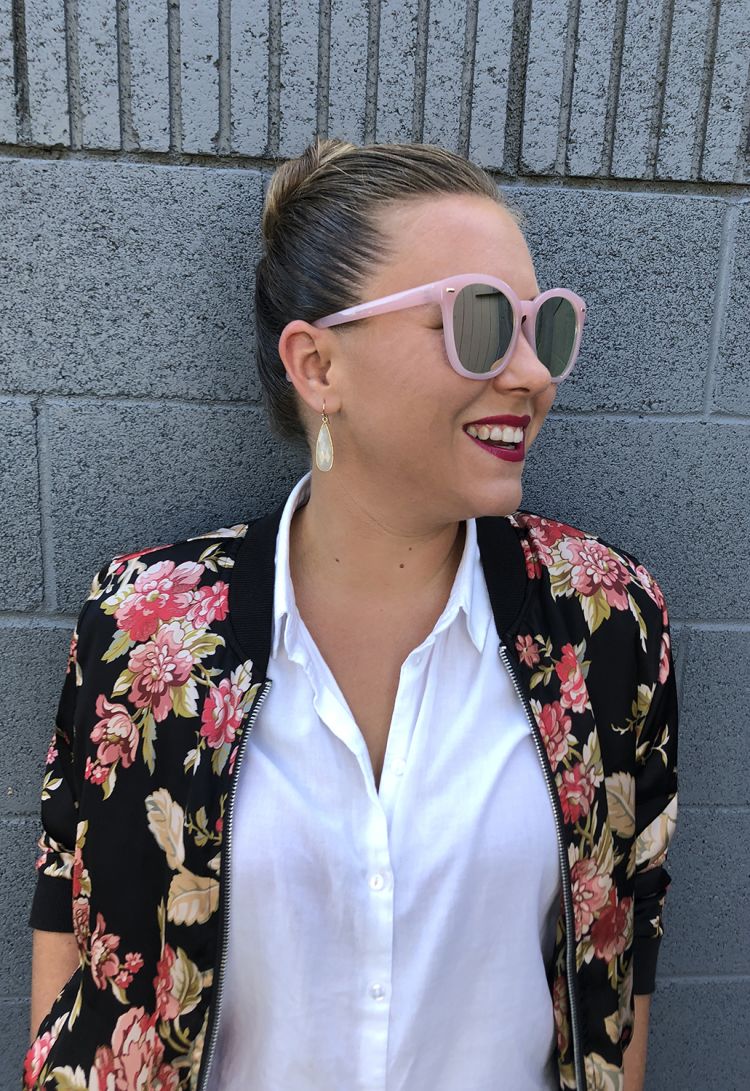
Liz Brochhausen
Liz Brochhausen
ANNA CLARKE
Midwest Regional Field Marketing Manager, Clif Bar & Company

One thing every female event marketer should never do:
Underestimate yourself.
#1 piece of advice for young women coming into the industry:
Remember that feedback is a gift—there is always something to learn even if feedback feels negative in the moment or is sometimes hard to hear. Find the nugget that will make you better at what you do. Learn to give great feedback to others and ask for it from your peers.
Favorite TED Talk, podcast or book:
“The book The Power of Moments,” by Dan and Chip Heath. It deconstructs the elements that all our most memorable moments in life have in common and then teaches you how unforgettable moments can be constructed. I love thinking about how we can create moments as experiential marketers that can have a lasting effect on consumers well beyond the event or activation.
If money and time were no object, what would be your wildest activation idea:
I got the chance to plan an event for Clif this past summer that was called “12 hours of Adventure in Chicago.” It was incredible how many outdoor urban adventures we fit into one day! I would love to plan “12 hours of Adventure” in every big city in the world to show that adventure is all around you, even in urban jungles. All you have to do is seek it out.
Kids, Plants or Pets:
I’m a crazy plant lady. I impulse-buy plants and I’ve started two garden clubs.
Favorite recent campaign, yours or another brand’s:
Our Equal is Equal campaign. LUNA Bar is rallying people to raise their collective voice against one of the longest standing inequalities—the gender wage gap. One way women can create immediate change is through negotiation. We partnered with the American Association of University Women and equal pay advocates Gina Rodriguez and Catt Sadler. The campaign came to life with negotiation workshops and an interactive experience aimed to help women identify their negotiation style and find resources to hone their skills.
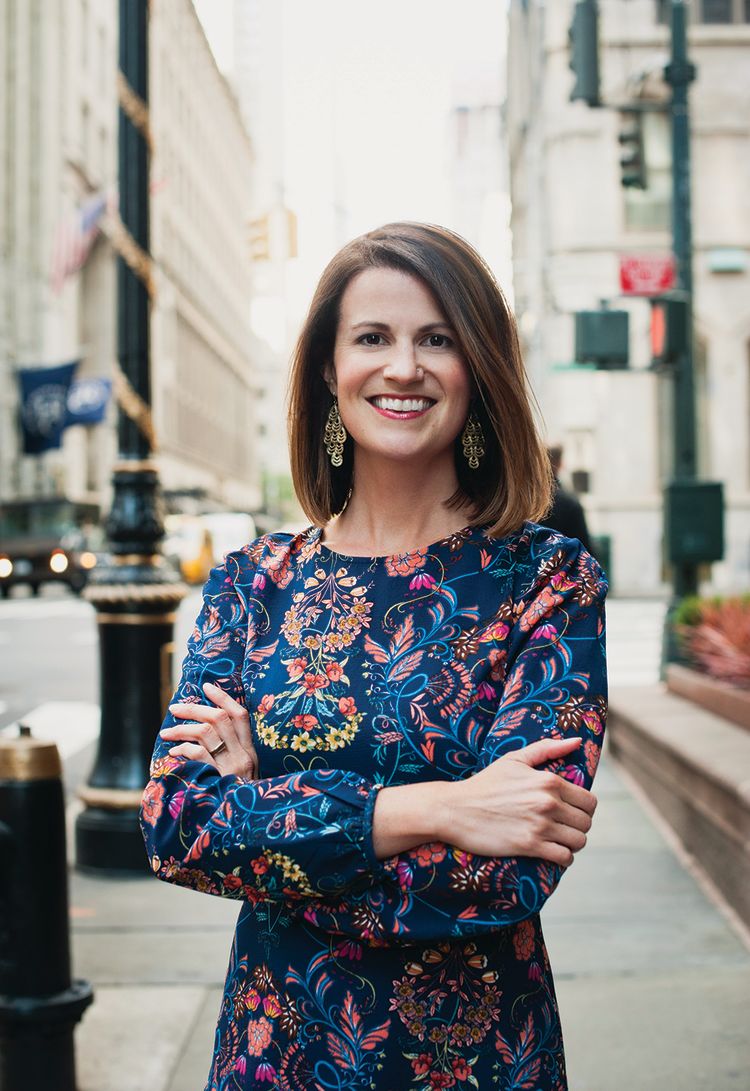
Anna Clarke
Anna Clarke
KIMBERLY WHINNA COTTRELL
Senior Manager-Experiential & Content Marketing, Autodesk

Best career advice, given or received:
The most amazing career paths can’t be planned and only make sense in retrospect. I could have never imagined this when I graduated from college but the role I have today—it completely makes sense. So don’t get too hung up in planning out the whole journey, understand careers aren’t always a linear path.
One thing every female event marketer should never do:
Lose track of the guest experience. Sometimes we get carried away with an idea and it’s always important to bring yourself back to the guest experience and how the experience you’re crafting will make the guest feel and what it will be like from their perspective.
#1 piece of advice for young women coming into this industry:
Not everyone has to get an MBA like I did, but educating yourself on business and marketing strategy is a great thing to do early on. No matter what type of initiative you’re pursuing as a marketer it’s always important to think about why you’re doing something and how it will impact your goals.
Favorite motto or motivational quote: “My mission in life is not merely to survive, but to thrive and to do so with some compassion, some humor and some style.” –Maya Angelou
Favorite TED Talk, podcast or book:
I love the podcast “How I Built This” with Guy Raz. As the daughter of an entrepreneur, I’m endlessly inspired by people who create something from nothing.
Most memorable recent professional win:
I was just named as an inventor of a U.S. patent alongside a team of Autodesk colleagues. It’s a testament to the power of a team and how people who have different skills and expertise, when they come together, can create really amazing things.
Email on vacation: Do, don’t or sometimes:
Don’t! Vacations are for unplugging. If you commit to unplugging you will come back refreshed and do better work.
Kids, Plants or Pets:
I have a toddler and a preschooler. They add a deeply fulfilling and expansive dimension to my life.
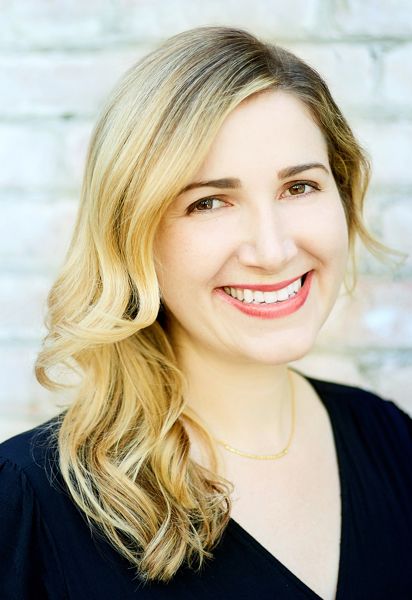
Kimberly Whinna Cottrell
Kimberly Whinna Cottrell
MONIQUE HARRISON
Head of Brand Experience Marketing, Mercedes-Benz

Best career advice, given or received:
Be present. A mentor once quoted this as the best way to feel satisfied with her work-life balance. By simply dedicating myself to the environment I am in and always being present, it helps maximize every moment, increase effectiveness and foster balance.
One thing every female event marketer should never do:
Be afraid to take risks and explore new, innovative ways to achieve better results. There’s no growth in comfort.
#1 piece of advice for young women coming into this industry:
Find one to two good mentors. There’s one key factor in getting what you need from a mentor: Make it easy for them to provide value to you. Be prepared, concise and clear on all communication. Don’t make them do heavy lifting to help you.
Favorite TED Talk, podcast or business book:
“What Got You Here Won’t Get You There,” by Marshall Goldsmith. I get the most out of coaching when I can independently read about it and apply principles on my terms. We all know what we need to do to get better… It’s just how and when we choose to act upon it.
Most memorable recent professional win:
We recently opened Mercedes-Benz pop-up retail stores in various cities. We’ve seen record numbers of converted customers that are new to the brand that represents real ROI as a result of those interactions.
Kids, Plants or Pets:
I kill all plants. Literally, nothing green can survive under my care. Regretfully, no pets. Two amazing girls, Kennedy (9) and McKenzie (3).
Favorite recent campaign, yours or another brand’s:
I’m a big fan of Nike’s gutsy campaigns. Whether you agree or disagree with Colin Kaepernick’s stand on the NFL, Serena Williams’ controversial tennis attire, etc., Nike makes daring choices and presents them in a compelling way. I’m a high-risk, high-reward kind of girl and these always pique my interest.

Monique Harrison
Monique Harrison
KRISTINE YAPP JONES
Global Event Marketing Manager, Twitter

Best career advice, given or received:
Treat everyone with respect no matter what level they’re at. Especially in our line of work, the best way to do this job is to have contacts and be a people person. If you’re treating everyone with respect, it makes it that much easier.
#1 piece of advice for young women coming into this industry:
Start at an agency. If you ultimately want to work at a brand and bring something to that brand, being able to work with lots of different clients and being the first one in the room and the last one out is the kind of experience you don’t get if you start at a brand. In an agency, you get to see a lot and learn what hard work is.
Favorite motto or motivational quote:
“Everything happens for a reason.”
Favorite TED Talk, podcast or business book:
A podcast “School of Greatness” by Lewis Howes. I’m also excited to read “Atomic Habits,” “Girl Wash Your Face” and “Tribe of Mentors.”
If money and time were no object, what would be your wildest activation idea:
I would like a bunch of different brands to get together and create a mission project. A lot of companies and people want to do good, but it would be awesome if they banded together to set up different mission projects around the world to areas that need help. Employees that wanted to could go and help—we’ve got a lot of man power and brain power and I think it would be the coolest thing ever.
Most memorable recent professional win:
I produced the tour sponsorship for the Lady Gaga Monster Ball. I was young in my career and ended up taking over the account. Still to this day it’s one of the most exciting projects I ever worked on.
Kids, Plants or Pets:
Definitely not plants, I can’t keep them alive.
Carry-on item that makes the travel more manageable:
EarPods. I didn’t realize how life-changing they were until I got them.
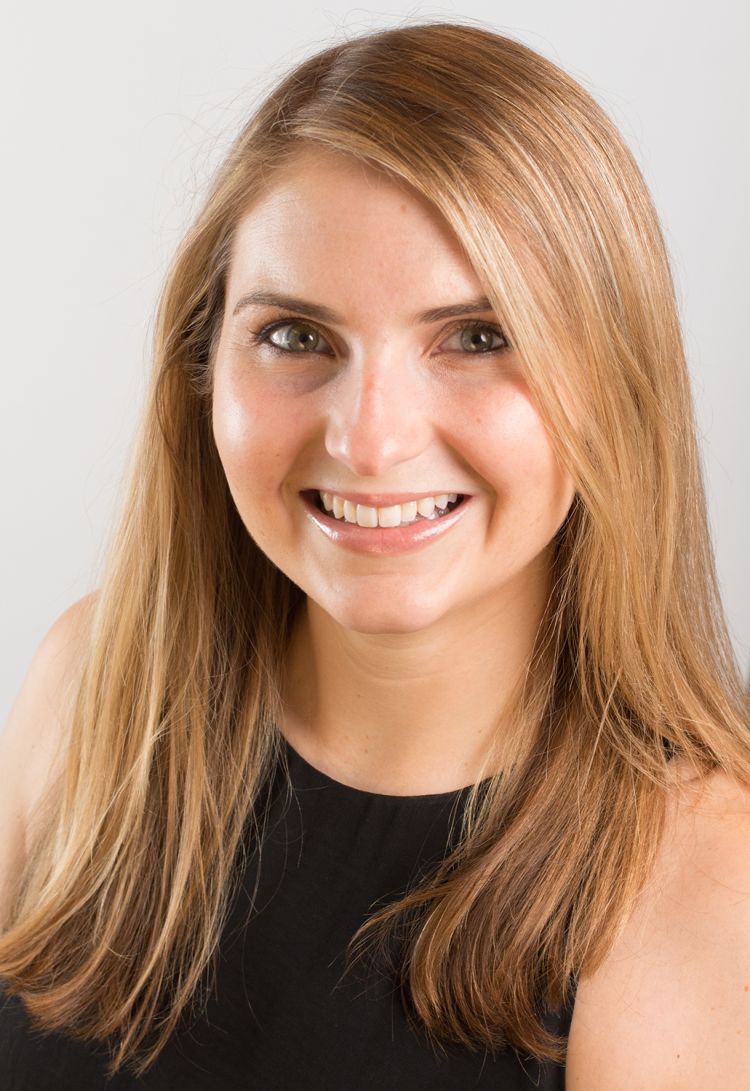
Kristine Yapp Jones
Kristine Yapp Jones
JENNIFER UTZ ILECKI
VP-Buzz Marketing and Partnerships, Marriott

One thing every female event marketer should learn to do:
As our industry continues to evolve, we need to do a much better job of articulating the value of experiential marketing. The onus is on all event marketers both female and male to showcase how our efforts impact and support the overall business. Investing the time to develop those meaningful KPIs and metrics is going to go a long way in solidifying experiential marketing’s position as a crucial part of the overall marketing mix.
Favorite motto or motivational quote:
“Be the change you wish to see in the world.” –Mahatma Gandhi
One thing every female event marketer should never do:
Don’t try to do everything on your own. In my experience, it takes a village to pull off a successful event. So, rely on your team and rely on your support resources. And don’t be afraid to ask for help.
#1 piece of advice for young women coming into this industry:
Stay curious, keep learning, ask questions, and above all, be open to inspiration and creativity because you never know where it’s going to come from.
Most memorable recent professional win:
Our activation at Coachella the past two years, which was an industry first. We wanted to weave our brands into the camping experience that takes place on the festival grounds, so we worked across eight of our lifestyle brands to turn safari tents into our actual model hotel rooms. It was so successful in year one that we decided to repeat it, except we upgraded the experience and turned luxury yurts into four of our W hotel properties from around the world.
Favorite carry-on item that makes the travel more manageable:
Noise-cancelling headphones coupled with an amazing Spotify playlist.
Favorite recent campaign, yours or another brand’s:
Refinery29’s 29Rooms. This year we integrated one of our brands, Moxy Hotels. It’s one of our fun, lifestyle brands aimed at the millennial traveler. We brought it to life in the form of a mischievous playhouse, which is core to the overall Moxy brand.

Jennifer Utz Ilecki
Jennifer Utz Ilecki
NICOLA KASTNER
Senior Director-Global Event Strategy, SAP

Best career advice, given or received:
Trust your gut. I learned that early in my career. I’m a data geek at heart and realized that brings a lot to the business table, but there’s a fine balance to be struck between putting all faith in facts and learning to listen to the information that’s conveyed through that gut feeling.
Most effective confidence booster:
Be prepared. Even if you’re blessed with tons of talent, the ability to succeed or feel confident doesn’t rely on that alone. It’s making sure I know what I’m going to say in a meeting and how I’m going to handle transitions.
One thing every female event marketer should learn to do:
Have a point of view and be confident about sharing it. It’s truly a key to climbing the corporate ladder and making a difference.
One thing every female event marketer should never do:
This is for anybody: No matter what role you’re in, there’s always more to learn and accomplish. And never underestimate the impact you have on others, especially other women.
#1 piece of advice for young women coming into this industry:
Often as people start their careers they’re so focused on the career path and what’s the next step to be successful. Find what you’re passionate about and success will follow.
Favorite TED Talk, podcast or business book:
The TED Talk “Life Begins at the End of Your Comfort Zone,” by Yubing Zhang. The lesson that we can take from it is that all your fears and your doubts and insecurities are in your head. And when you work to condition your mind to be free of those, it’s empowering and allows you to accomplish more than you ever thought possible.
Favorite recent campaign, yours or another brand’s:
The Mattel campaign for Barbie. They turned a brand that had lost relevance into something completely different. It showed Barbie is not a superficial toy, but rather a toy that allows little girls to dream and imagine what they want to be one day.
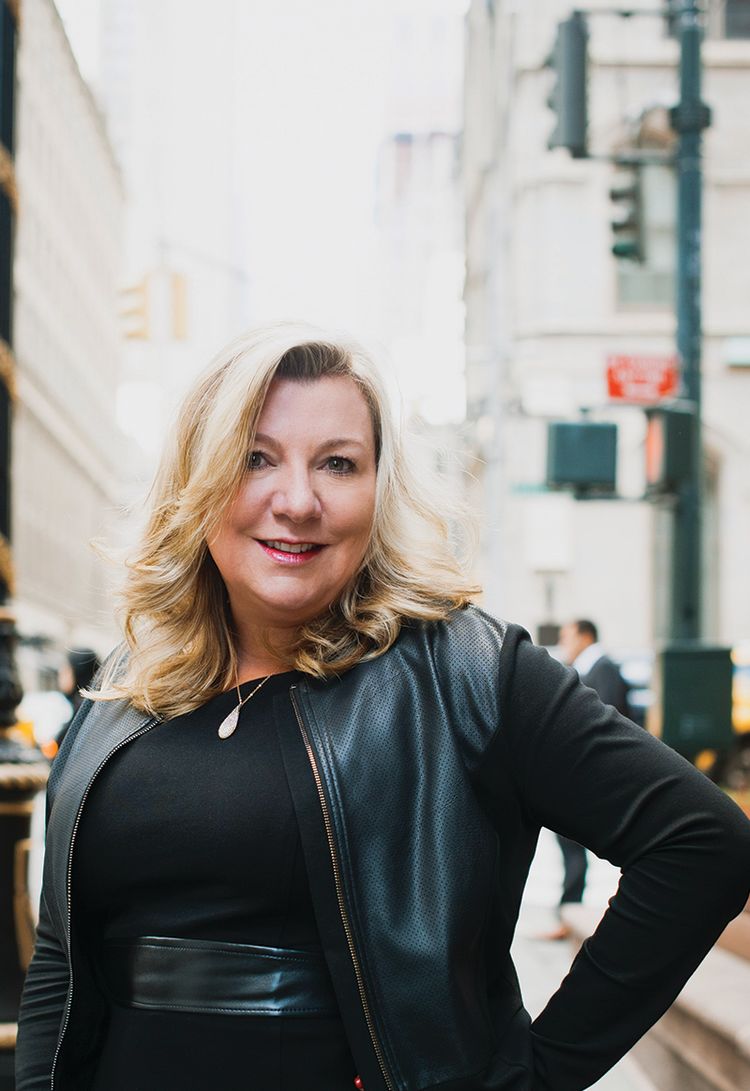
Nicola Kastner
Nicola Kastner
KATRINA KENT
Director-Event Group, TD Ameritrade

Best career advice given or received:
Life is too short for a bad marriage or a bad job. And when people ask to move on, let them go. Don’t try to keep them.
One thing every female event marketer should learn to do:
Actively listen. Event marketers are natural activators and have a tendency to take over. Giving other collaborators the space to articulate their ideas without jumping in to manage everyone’s ideas is critical.
One thing every female event marketer should never do:
Never jump to conclusions, because when we jump to conclusions we often miss something that’s going to be really important.
#1 piece of advice for young women coming into this industry:
Make sure that you cultivate relationships. You never know what may lead to what. Be interested and open with those around you regardless of what industry they’re in.
Favorite TED Talk, podcast or book:
I love Gallup’s StrengthsFinder. Learning about your top strengths and top strengths of others on your team and then diving into how they complement each other is a game changer. It’s resulted in better communications, results and satisfaction across the team.
Most memorable recent professional win:
Due to some bizarre circumstances and schedule changes, I ended up having to call production on a show myself in Las Vegas. On the fly. It was crazy.
Email on vacation: Do, don’t or sometimes:
Don’t. Church and State it. Give it a rest when you can.
Carry-on item that makes the travel more manageable:
CBD oil. What isn’t CBD oil helpful for these days?
Favorite recent campaign, yours or another brand’s:
My team recently riffed on our green room ad campaign for a live activation at The Northern Trust PGA golf tournament this summer. We built a green room on the green as a space to relax and have conversations about investing in everyday language. It was great to bring our ads to life.

Katrina Kent
Katrina Kent
ELIZABETH MALAFA KURMAN
Director-Global Events, Under Armour

Most effective confidence booster:
Staying on a regimen of working out, even if it’s just for 20 minutes a day. I feel so much more relaxed and put together and feel like I can tackle anything.
One thing every female event marketer should learn to do:
Don’t shy away from sitting at the table with all men. I was in football for a long time and I would be the only female at the table. Don’t be afraid to speak up and share your ideas, because a lot of times you’re the expert in your field.
#1 piece of advice for young women coming into this industry:
Follow your heart. It sounds a bit cheesy, but this is an industry where there are long hours. As a young professional you’re going to be expected to put in weekends and holidays. But if it’s something you truly love and you’re passionate about, following your heart is the best advice.
Favorite motto or motivational quote:
“The future belongs to those who believe in the beauty of their dreams.” –Eleanor Roosevelt
Favorite TED Talk, podcast or book:
The “How I Built This” podcast. They interview so many different types of entrepreneurs and creative people and it gives you a chance to see their story. If you can get one nugget from what you’re listening to then I think it’s a win.
If money and time were no object, what would be your wildest activation idea:
An event lives for just a finite amount of time, so it would be cool to have people travel for a 24-hour event that circumnavigated the globe to different pop-ups. In each city an activation would happen. It would be so fun—you could roll social media for 24 hours.
Favorite recent campaign, yours or another brand’s:
Our recent campaign that we just finished, “Will Finds a Way,” with The Rock. It had an inspirational component that motivated people to create a healthier lifestyle for themselves and their peers. We need to sell shoes and shirts as a brand, but if you can also carry a positive message while doing it, it makes it so much more enjoyable.

Elizabeth Malafa Kurman
Elizabeth Malafa Kurman
LAURA LOVAS
Executive Director-Strategic Partnerships & Events, ABC

Best career advice, given or received:
The best leaders are the best learners. While it’s important to speak up, it’s equally important to listen and be endlessly curious, ask questions, seek out diverse perspectives, solicit feedback and always be receptive to new ideas. The moment you stop seeking is the moment you stop being relevant.
Most effective confidence booster:
Project confidence. Doubting yourself and your perspective really gets you nowhere. Embrace the fact that you’re in your role because you bring a certain level of expertise to the table that brings your company value.
One thing every female event marketer should never do:
Never lose sight of the end goal. In this industry we’re often so caught up in the spectacle and the instant gratification of these experiences, but we need to apply that same effort into ensuring that the impact is sustained beyond the activation itself.
#1 piece of advice for young women coming into this industry:
Nobody is going to hand you anything. It’s beyond important to be your own greatest advocate. Always speak up. If you have an idea, share it. If there’s an accomplishment you’re proud of, tell people about it. Don’t be afraid of having frequent, direct conversations with your leaders about what you’re bringing to the table and where you see your career headed.
Most memorable recent professional win:
This fall we executed a phenomenal “Grey’s Anatomy” pop-up art gallery to celebrate the premiere of our 15th season. We worked with PopSugar and the 1994 Museum to highlight over two dozen iconic moments from the series via custom commissioned artwork and interactive installations and props. We were thrilled to see the real emotional impact the gallery had as attendees experienced their favorite show in such a unique way.
Email on vacation: Do, don’t or sometimes:
Don’t email on vacation. Burnout is a real risk for employees in this business and those breaks are crucial for long-term motivation and productivity.

Laura Lovas
Laura Lovas
AMY MARINO
VP-Global Experiential Marketing & Talent Management, American Express

Best career advice given or received:
Stay true to yourself and trust your instincts. There will always be a pressure to alter your opinion or adjust your work to satisfy the priorities of someone above you, or maybe to even fit into a new culture if you’re starting a new job or find yourself on a new team. Trust your gut and keep in mind that people in this industry respond to and recognize authenticity.
One thing every female event marketer should learn to do:
This is male or female: Get into the habit of reading the news every day. It’s so important for us to keep on the pulse of what’s going on in the industry, who’s doing what kinds of events, where brands are starting to show up and what’s driving conversation so that you can make that a part of your decision-making.
#1 piece of advice for young women coming into this industry:
Stay tuned into cultural heat moments and collaborate with the people around you. Your colleagues might be into a completely different cultural segment than you are. But if you can bring ideas together it offers new ways to authentically bring your brand to life or insert your brand into different types of conversations.
Favorite TED Talk, podcast or book:
The podcast “Radical Candor.” It has helped inform the way that I give and, in particular, receive feedback. Feedback is an important part of working effectively as a team and also being a great leader.
Memorable recent professional win:
Last year our Small Business Saturday team won the gold Effie for our Sustained Campaign. It validated the importance of continuing to invest in things that don’t just have an impact on your business but also have an impact on society at large.
Favorite recent campaign, yours or another brand’s:
What Nike did with Colin Kaepernick. That was an amazing example of a brand staying true to their mission, which is to further the careers of athletes. They happened to take a social stand, but it was connected to their brand and their mission and that made it that much more poignant in the marketplace.
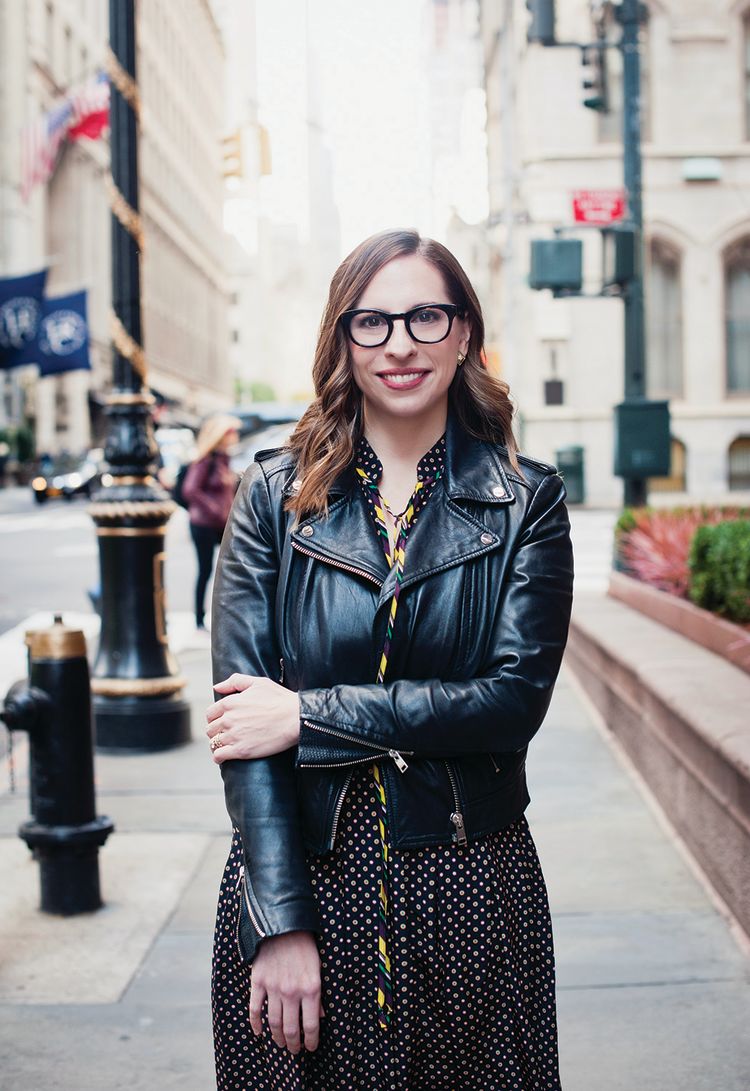
Amy Marino
Amy Marino
CASEY O'LOONEY
Senior Manager-Global Marketing, Cisco

Most effective confidence booster:
More than anything, knowledge in the subject matter. I work with very smart technical leaders and sometimes our subject matter is very complex. You don’t need to be the expert but you do have to come away with the big ideas that will resonate with the customers and attendees.
One thing every female event marketer should learn to do:
Build relationships and partnerships. I am not an expert at everything, but chances are someone I know in my circle of influence will be and I can leverage those relationships in times of need.
#1 piece of advice for young women coming into this industry:
Try different things—different career paths, different roles—and enjoy the people you meet and things you learn along the way. I changed my overall career at least three times. I didn’t plan to work in experiential marketing, but it all led me to this perfect role.
Favorite motto or motivational quote:
“Success means we go to sleep at night knowing that our talents and abilities were used in a way that served others.” –Marianne Williamson. I really like the idea of “servant leadership” and looking for opportunities to serve others to achieve goals.
Email on vacation: Do, don’t or sometimes:
Sometimes. I wish it was a “don’t,” but it’s not.
Kids, Plants or Pets:
Cats. There are never enough funny cat videos on the internet or in the world.
Carry-on item that makes the travel more manageable:
Noise-cancelling headphones. They’re expensive but they are the best.
Favorite recent campaign, yours or another brand’s:
I am really proud of Cisco’s Connected Conservation campaign. We use technology to battle poaching and save rhinos and elephants and other endangered species. I am so proud of this cause. I have a soft spot for wildlife and look forward to creating a world where elephants and rhinos can roam free.
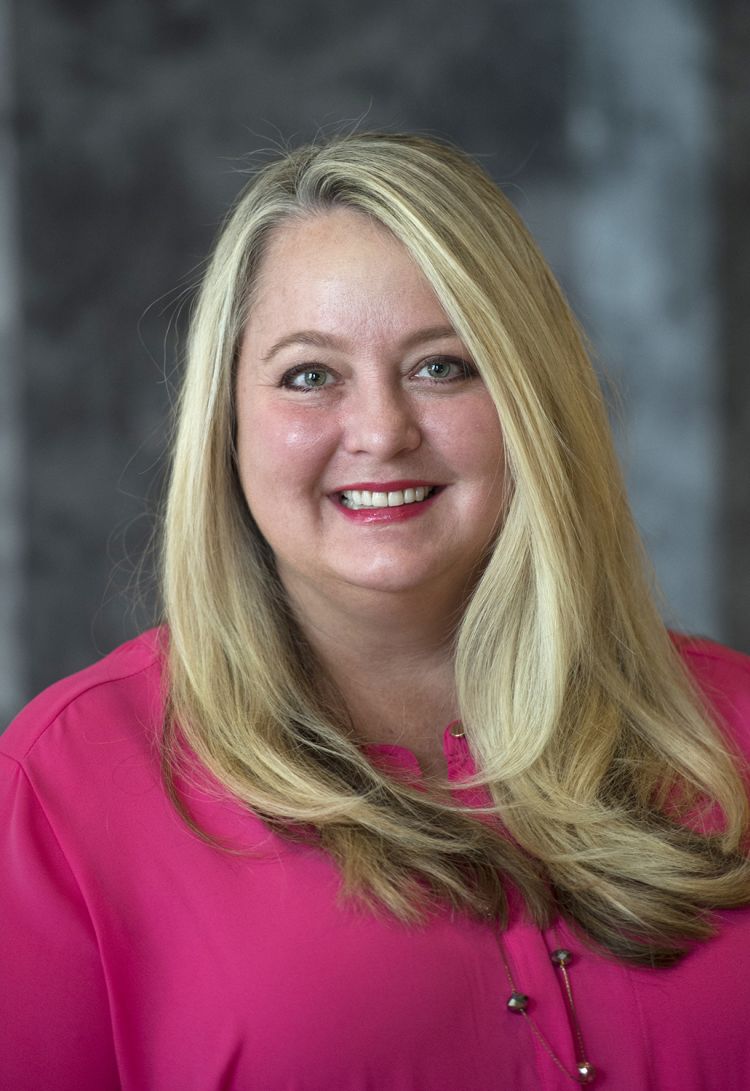
Casey O'Looney
Casey O'Looney
MEREDITH STARKEY
VP-Sponsorships and Events, T-Mobile

Best career advice, given or received:
“Change the energy and change the outcome.” It’s really about how we show up with our teams, our organizations and our partners and the energy we bring to conversations, and how it can positively or negatively impact an outcome. When you think about the event industry and what can happen in the pressure of a live event and in a moment, the positive energy we can bring to any circumstance can have such an impact on a team.
One thing every female event marketer should learn to do:
Prioritize! To me, prioritizing what you’re doing and how you spend your time and resources is really helpful in driving effectiveness and efficiency in your work and in trying to achieve work-life integration.
#1 piece of advice for young women coming into this industry:
Be bold, be brave, seize opportunity, make the most of each opportunity, and more opportunity will come your way. I’ve seen it in my own career. I’ve seen it in the team that I have the privilege of leading.
Favorite motto or motivational quote:
Not surprisingly, it’s a quote from Vince Lombardi, given my team stewards and oversees what we do in sports: “Perfection is not attainable, but if we chase perfection, we can catch excellence.”
Most memorable recent professional win:
I’m really proud of an event we did with a partner, “T-Mobile Presents the Tonight Show, Starring Jimmy Fallon,” live from Central Park. It was the first time in the history of late-night programming that a late-night show was done live in Central Park.
Favorite recent campaign, yours or another brand’s?
Our team’s campaign, Home Runs for Hurricane Recovery, #HR4HR. Together with Major League Baseball, players and fans, we raised, over the last year, more than $5.1 million for veteran-led organization Team Rubicon to help those who have been impacted by the devastating hurricanes. To use an event platform like MLB post-season to do good, and rally fans and players behind that, was special to be a part of.
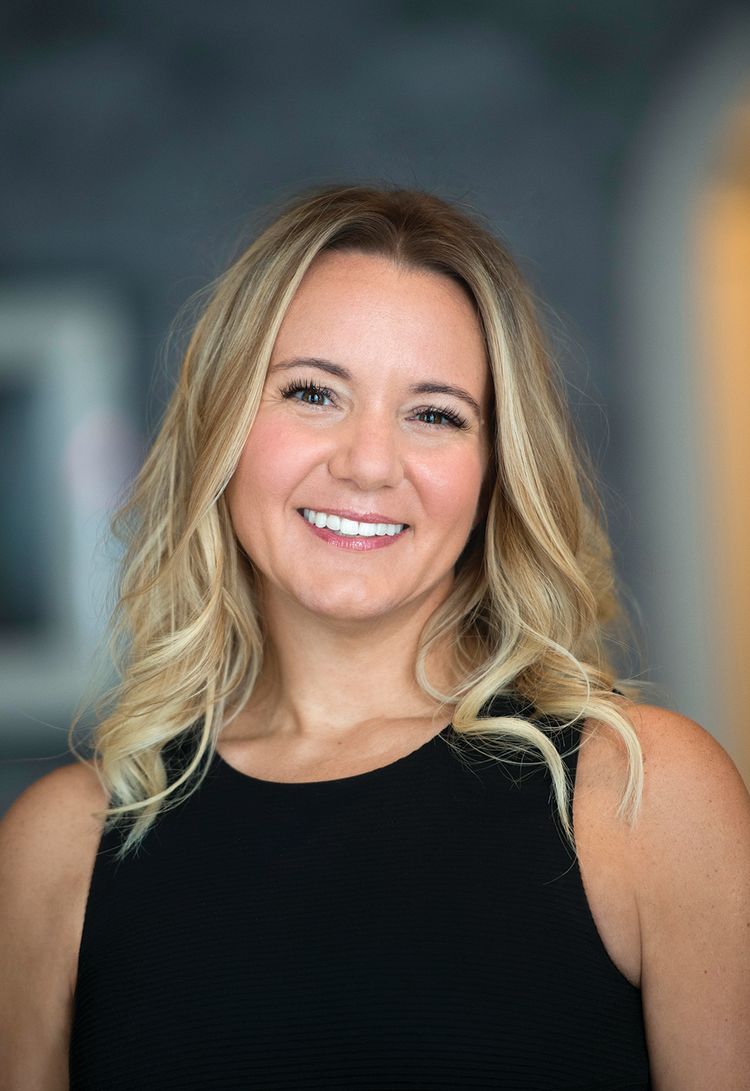
Meredith Starkey
Meredith Starkey
LINDSAY TOLLES
Global Experiential Program Manager, Dell

Best career advice, given or received:
Know your audience. From a marketing perspective I think about it all the time, but it’s also applicable to managing a career and building relationships with others and knowing what different people you interact with care about so you can position your message in a way that resonates with them.
One thing every female event marketer should learn to do:
Learning to say no is really important. We tend to want to say yes to everything and we overload ourselves. You have to say, “There are limits to what I can do,” and start to learn to push back and delegate.
#1 piece of advice for young women coming into this industry:
Don’t stay in your lane—learn everything around you. It gives you a better perspective on how everyone contributes to the overall outcome.
Favorite motto or motivational quote:
“If you change the way you look at things, the things you look at change.” –Wayne Dyer. It goes back to having an open mind and not being too locked into your own plans. And remembering to take another perspective on things and a whole new world of possibilities might open up for you.
Most memorable recent professional win:
Our SXSW activation had some amazing results. We ended up being No. 1 in share of voice for tech brands, outshouting the big brands like Google and Facebook.
Kids, Plants or Pets:
One 16-year-old cat. I’m not very good with plants. They fight for themselves at my house.
Favorite recent campaign, yours or another brand’s:
The “Slingers” campaign is really clever and goofy. We also have a great campaign for Dell Technologies right now around digital transformation called “Make it Real” with Jeffrey Wright. It highlights the things that technology is enabling us to do in healthcare and the auto industry and other industries. I think it’s really well done and a positive message.
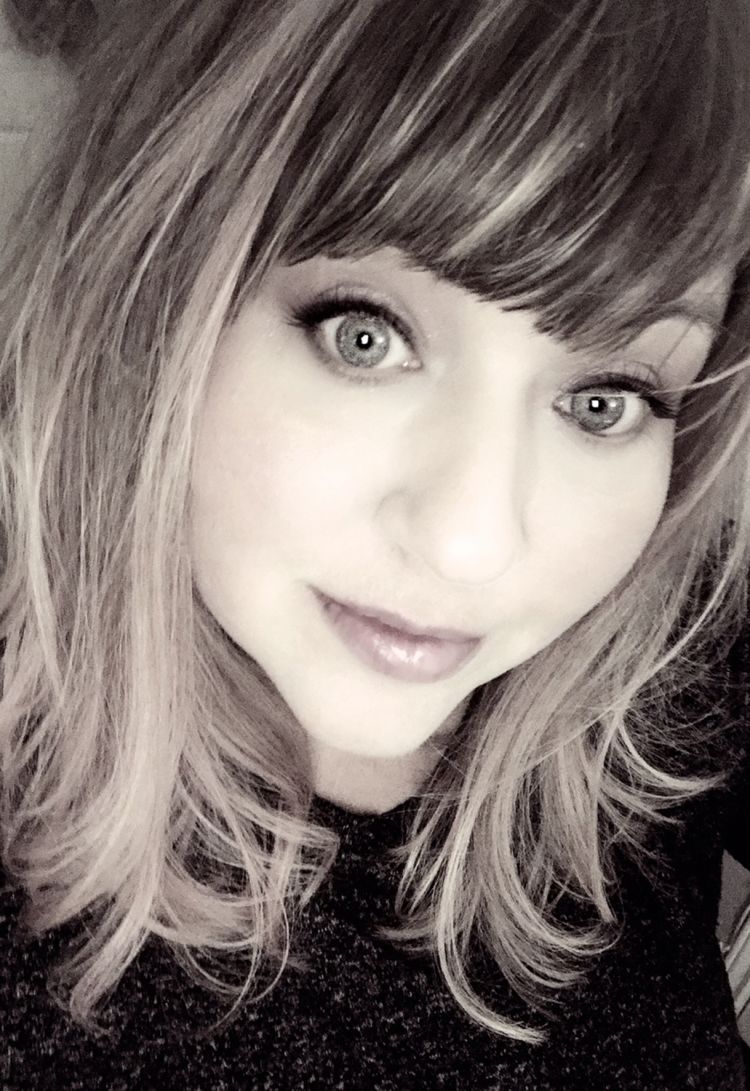
Lindsay Tolles
Lindsay Tolles
ELIZABETH WINDRAM
VP-Marketing, JetBlue

Best career advice, given or received:
Go slow to go fast. It’s good to spend some time, especially at the beginning of your career, building up your skillset, putting tools in your toolbox and gaining experiences so that later it can come together in a very powerful way.
Most effective confidence booster:
Preparation. When I know what to expect and I’m controlling my controllables, I can pivot then when something needs to be adjusted.
One thing every female event marketer should learn to do:
Read as much as you can and look out at the world around you, not just in marketing, but art, current events, trends… The best marketers apply everything they see to modern and innovative brand work.
One thing every female event marketer should never do:
Dismiss sources of ideas, because great ideas can come from anywhere.
#1 piece of advice for young women coming into this industry:
Quiet the negative voices in your own head that tell you that you can’t do things or that you’re not enough. Tell yourself a new story that says, “I’m passionate about what I want to do and I’m excited to contribute.”
Favorite motto or motivational quote:
“Leaders lead.” I say that to my team and then to myself, and sometimes even to my leaders.
Favorite TED Talk, podcast or business book:
Ben Horowitz’s book, “The Hard Thing About Hard Things.” It is the most helpful and real account of what it takes to lead people and business that I’ve ever read.
Most memorable recent professional win:
A program we called “Pie in the Sky.” As New York’s hometown airline, we sent pizza from New York to L.A, delivering a slice of our home. It highlighted our transcontinental flying routes, got a ton of buzz and worked hard for the brand and tactically for the business.
Kids, Plants or Pets:
Kids! I have a daughter and she is the most magical human being I know.
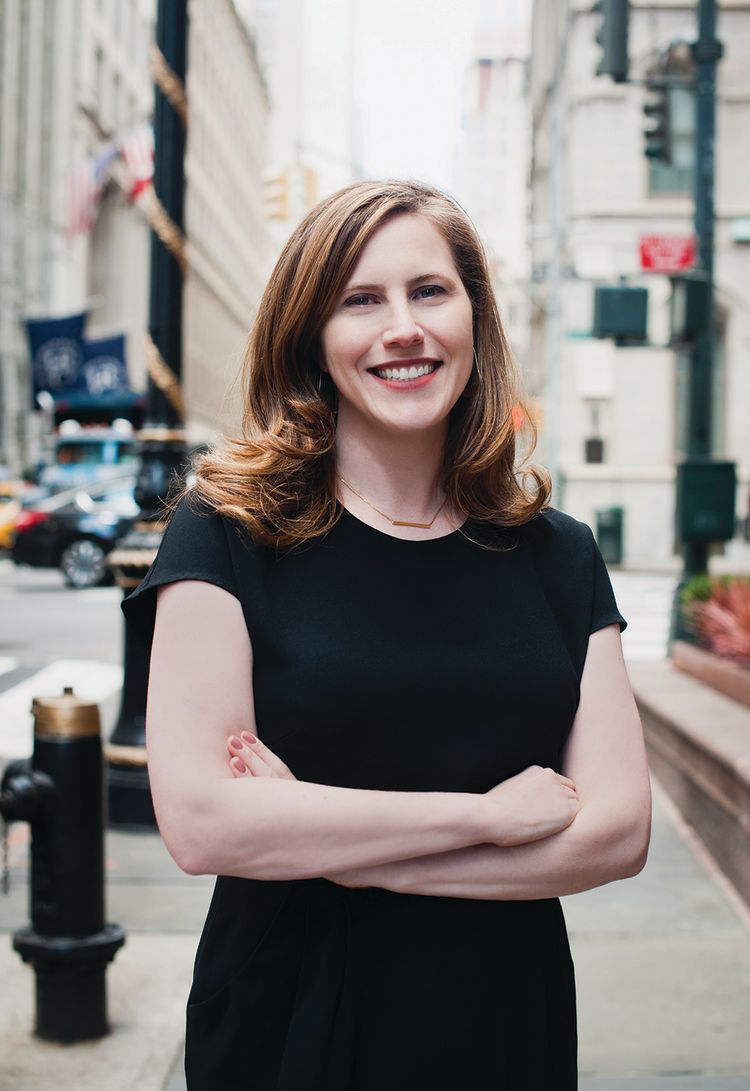
Elizabeth Windram
Elizabeth Windram
SORRY, NOT SORRY
Candid excerpts from our bi-coastal conversations with this year’s Women in Events

THE PANELISTS:
Liz Brochhausen
Senior Manager-Experiential
Marketing and Live Production
Pandora
Anna Clarke
Midwest Regional Marketing Manager
Clif Bar & Company
Monique Harrison
Department Head of Brand Experience Marketing
Mercedes-Benz
Jennifer Utz Ilecki
VP-Buzz Marketing and Partnerships
Marriott
Kristine Yapp Jones
Global Event Marketing Manager
Twitter
Nicola Kastner
Senior Director, Global Event Strategy
SAP
Katrina Kent
Director, Event Group
TD Ameritrade
Laura Lovas
Executive Director, Strategic Partnerships & Events
ABC
Elizabeth Malafa Kurman
Director, Global Events
Under Armour
Amy Marino
VP-Global Experiential Marketing & Talent Management
American Express
Casey O’Looney
Senior Manager, Global Marketing
Cisco
Meredith Starkey
VP-Sponsorships and Events
T-Mobile
Lindsay Tolles
Global Experiential Program Manager
Dell
Kimberly Whinna Cottrell
Senior Manager, Experiential
& Content Marketing
Autodesk
Elizabeth Windram
VP, Marketing
JetBlue
Co-Hosted with:
Keirsten Hammett
Partner
Proscenium
CO-PRODUCED WITH:

EVENT MARKETER: Is the issue of gender equality creating any obstacles for you in your career? If so, how can event marketers make the experiential industry a more equitable place to work?
LINDSAY TOLLES: I don’t think about obstacles at all. I don’t ever think there’s anything I can’t do. My organization is dominated by women—really strong women who do amazing work and get it done—so I’m not thinking about what the male factor is. They don’t factor into my world because they’re not there; they’re not doing the work. But I know it’s something that needs to be discussed and we spend a lot of time at Dell empowering women internally and externally.
LIZ BROCHHAUSEN: I think it depends on your industry. I’m at this interesting crux between technology and the music industry, which has been predominantly male for so long. I’m constantly having road guys mansplaining to me about how live production works. It’s like, “Thank you so much. I’ve been doing this for 10 years.” But I think it just depends on the industry that you’re in and how much progress women have made there.
KRISTINE YAPP JONES: The events industry as a whole, and maybe this is what we need to change, is a very thankless industry. People do not understand what we do. Every week we have to educate our cross-function teams on how much an event actually costs. No one understands what it is and how much goes into it. Maybe that’s something we need to change first.
CASEY O’LOONEY: We’re fortunate because Cisco Live is, in a lot of ways, really driving strategy. So instead of looking at us like we’re “only the event team,” they’re looking at us like we have a valuable resource that they want, which is that one-to-one interaction with customers. One of the things that we do to help with [that perception] is take a lot of internal marketing teams through the event strategy process. And they think it’s one of the best things that has ever happened, because they get to have a facilitated session on what they’re trying to accomplish and who the audience is they’re trying to bring in. I’m fortunate that we’re really seen as trailblazers, mavericks—smart, strategic women on the events team.
KIMBERLY WHINNA COTTRELL: I think in the last few years there seems to be so much more appreciation for what we do. The company rallies around events strategically and there’s been a ton of respect for the team that manages them. It’s so fabulous to see that appreciated. It’s something I’m enthusiastic about. The more that we can be seen as a strategic part of the marketing mix, the more the leaders that are running experiential programs that are women can go up to other positions. It can’t be seen as this service niche of the organization, but as a strategic marketing powerhouse.
MEREDITH STARKEY: I think we’re in an exciting time for experiential, too. The pendulum is shifting in this direction, which means more opportunity. With linear television consumption continuing to decline, it is becoming more about the experience one has with a brand, and with the proliferation of social media the ability to share that experience. It’s exciting to think about as we go forward, the role we can play in the marketing mix as we move from a logistics- and planning-first mindset to seeing events as an opportunity to bring the brand story and experience to life in a multi-dimensional way that goes deeper than what TV advertising alone can deliver.
O’LOONEY: Exactly. With live, you’re engaging the senses, which you’re not really able to do through a screen. And that’s what I love so much about our programs, that it’s the touch, it’s the feel. I also think people are so used to living their lives through social media now, that when you can get them into a room and give them something that’s real and tangible, it’s just so much more impactful and meaningful for a consumer.
AMY MARINO: I think what is so valuable about experiential that can be much more difficult to crack with some of the other marketing disciplines is that you have the opportunity to build both rational value in the minds of your customers as well as emotional value. And that’s where experiential marketing really factors into the brand building process and brand marketing versus just performance marketing. I think we’re all lucky if we can work at companies where that is truly valued, because the emotional connection that a consumer has with your brand can be what builds the greatest loyalty.
"The more that we can be seen as a strategic part of the marketing mix, the more the leaders that are running experiential programs that are women can go up to other positions."
KEIRSTEN HAMMETT: We’ve seen a trend where events teams are actually moving from under HR and reporting to marketing, which makes a huge difference in terms of budgets and the importance placed on live events. So I do think there’s a ton of opportunity, once events are not a sub-channel, but, an equal channel.
WHINNA COTTRELL: Our experiential marketing teams are all within our brand and impact team and that’s so important that we sit alongside the content marketers and social media team and the creative team. The power of what we can all do together sitting on the same team is so much greater than if we are in different corners of the business. So that’s definitely a powerful part of our structure.
MONIQUE HARRISON: I wish I knew it sooner: There’s no need to think we’re at a disadvantage just because we’re smaller in number. Instead, appreciate the voice that can represent a female point of view and operate just as you are viewed: a valuable contributor. This is coming from someone who has worked in technology and automotive for years, where there’s often a smaller percentage of women in the room than men. Add on the fact that most of the companies I have worked for heavily invest in sports…so maybe reduce the percentage of women represented a bit more.
EM: Women in events have very unique challenges when it comes to having a family—travel being top among them. Can you share your perspectives on raising a family in this business?
BROCHHAUSEN: I have a three-year-old, and it’s difficult to be on the road almost 200 days a year while having a toddler. They don’t understand at that age where Mommy goes or what she’s doing. But I have always thought that it is so important for us to teach our daughters the importance of following your dreams and the importance of being a badass boss. I think it’s important, especially when you’re dealing with kids, to realize the value that you’re bringing into their lives by being a hard worker and by having an important career that drives you and that you’re passionate about.
LAURA LOVAS: Being a working parent, and especially a working mother, definitely has its challenges. I think we all have a responsibility to be a champion of women and to build them up and to support them and stay away from negativity and gossip and criticism, because I think there’s enough of that naturally happening. We can do so much if we ban together and really have that support network as we are raising our children and serving as mentors to younger women within the organization.
WHINNA COTTRELL: With only five percent of Fortune 500 CEOs being women, more representation by women at the top of companies is needed. I’m not saying that it’s definitely a gender thing, but if there were more women in leadership, I think systematically there would be more programs that would help women as they navigate parenthood. I have two children and the last five years of having a child, and having another child and navigating that—it’s been so critical to work at a supportive company. And yet, it still feels like it’s very much a time that we’re pioneering how to make that work. I would love for the next generation to have programs in place and more systems that would help them navigate these kind of seasons of life that are really challenging.
YAPP JONES: Twitter is great. They’re very supportive. But how do I navigate getting myself out and getting myself back in, because I have not done it yet.
BROCHHAUSEN: I think that’s really about having a strong team that you trust to keep the train moving while you’re out, because either way, it’s going to go. I was very nervous about going out on maternity leave when I did, but you just realize that as long as you’ve hired good people, they’re going to carry on while you’re out.
And I think that brings up another point: we have so many demands on our time as women, to be good friends and mothers and daughters and producers and artists and all of the things that we’re required to be doing in this job. And I think self-care is one area that I’m constantly trying to focus on more because as women, we need time for ourselves. We need time for self-care. And I think that was one thing that maternity leave forced me to identify and really nurture and work on, was care of me in addition to care of everyone else and everyone else’s priorities.
LOVAS: I have two small children as well, but this also applies to women that don’t have children because there are often things that happen in our lives, whether that’s taking care of elderly family members or illness or other things that come up, that really demand our attention. I think women traditionally take on so much, whether that’s in the workplace or within the household or within the family. So I think it’s really just building that support system and seeking out other women who are in similar situations or are likeminded to have a place to vent and to share ideas and advice and figure out how to stay sane because it can be a real challenge.
EM: Many young women still struggle with developing confidence in the workplace. Can you share some tips that have worked for you?
ANNA CLARKE: One way that young women can build confidence is honing their negotiation skills. I think a lot of women only think about negotiation when it comes time for a new job or a promotion, but those skills can help build confidence in everyday situations. Another way to build confidence is to talk with other women—friends and coworkers. Create a network. Talk about your struggles because other women have faced similar challenges and can offer advice from their experiences.
"I think we all have a responsibility to be a champion of women and to build them up and to support them and stay away from negativity and gossip and criticism, because I think there’s enough of that naturally happening."
O’LOONEY: I agree. We’re seeing a lot of younger women find their confidence and their strength in communities. When you talk about the pay gap and how people are negotiating their salaries, they talk to each other now. And they know how much each of them are making. And I’m proud of them for doing that because it’s strength in numbers. If this is what my colleague is getting or this is what so and so in engineering is getting, then I deserve to get this, too. It’s interesting to see the way confidence is derived in different generations.
JENNIFER UTZ ILECKI: That’s right. I think women need to be confident, self-assured and willing to think creatively to make their mark. To do this, it is important women feel secure within the organization and supported when it comes to pitching their ideas and plans.
At Marriott we are fortunate to work for a company that supports the presence of women in the highest level of management and in key decision-making positions. I can honestly say that women’s leadership is a business imperative that is vital to Marriott’s success. The company has policies and practices that range from creating a welcoming and inclusive environment to providing the tools and resources necessary for supporting employees in managing their work and personal lives. More than 50 percent of our ceo, Arne Sorenson’s, direct reports are women.
HAMMETT: I think knowing what you bring to the table early in your career and being able to articulate those strengths to other people is so crucial in career growth. Younger women coming up in their career often wait for people to notice them and their accomplishments or wait for the acknowledgment that they’re doing a good job, but if they have the tools to be able to articulate what their strengths are, they can advocate for themselves. It’s a hard thing to do, especially if you end up in the room and you are the only woman at the table, but there is so much power in finding your own voice.
HARRISON: Women tend to be a bit hesitant to aggressively build business contacts. For years, this plagued me. I had no problem doing it at my kid’s school events and activities, but I didn’t take the same approach at work. I committed to getting much better at it and I’ve seen a noticeable change in my business support structure and my comfort level to consistently build a network through business channels. As cliché as it sounds, networking works.
LOVAS: I think it’s important to reinforce the fact that you have been hired for this role because you bring a specific skillset and a specific level of expertise to the table that is valuable to the company and fulfilling its goals. And speak up. If you have an idea, share that idea. If you have an accomplishment, talk about that accomplishment. Have direct conversations with your leaders and make sure that it’s very clear between you what you see in your career, what value you’re bringing to the table and looking ahead, where you see yourself going. And then, back that up by becoming the master of your domain and really delivering the goods. Self-doubt doesn’t get you anywhere. You have a voice and you’ve been hired to use that.
BROCHHAUSEN: I think celebrating the wins is a big one. So often we as event professionals will leave a program with a laundry list of things that we want to change for next time, and all of the things that might not have gone the way that we wanted them to, but I think it’s really important to stop and take a minute and say, “We did that. We won.” I don’t feel like enough people really take the time to congratulate themselves on a job well done, especially some of the younger women on my team.
WHINNA COTTRELL: That’s a really good point. It’s kind of a long-term strategy, but I would also suggest challenging yourself to do things that may seem risky. It will eventually give you a lot of confidence once you get through it and you succeed. Sometimes you’ll fail, too, but go for those challenging roles or projects and when you do succeed, you’ll be so much more confident.
O’LOONEY: I think confidence comes from having a really solid sense of self. And everyone gets that in a different way. When I go into a room, I want to make sure that I am extremely knowledgeable. So I spend a lot of time trying to be well-rounded, learning different things, being able to have a personal conversation with people. Because at the end of the day, we’re all human beings. We’re all trying to build a relationship. So, that’s the way I approach it—really looking at it like, how can I build a relationship? How can I build a partnership? Just knowing that I’m coming about it with the best of intentions is what builds my confidence.
"As an experiential community, we have a voice to encourage conversations and change. There are a lot of brands and companies who are making efforts to help advance gender equality. I’m hopeful that together we can help make lasting change for the better."
EM: What makes a great experiential leader in 2018? What are some of the must-have skills?
UTZ ILECKI: Being endlessly flexible is the number one skill needed. Candidly, I’ve found from working in experiential marketing that there is a high probability something will not go according to plan. It is critical to the success of the activation to develop contingency plans, keep calm under pressure and roll with the punches. Approach activations with a problem-solving mindset so that you’re not thrown when things deviate from plans. Also, be nimble, knowing that it’s not going to go exactly as you envisioned and there will inevitably be a need to act quickly as anything can happen such as cancelled flights, issues with talent, shipping delays, delayed visas for teams working international activations, the list goes on. In fact, when things are going super smooth and according to plan, I’ve said to my team, “This is too good to be true. Something’s going to break very soon. Let’s stay on our toes.” Having everyone at the ready to remedy issues behind the scenes makes a huge difference.
HARRISON: Organizationally, it’s understanding the value experiential marketing means to business and being able to effectively communicate that up, down and across, to gain the proper support needed throughout your organization.
STARKEY: Flexibility, agility, adaptability. And, the ability to project a calm and confident presence when others around you may be feeling nervous or uncertain. They are looking to you and how you respond in the moment.
MARINO: Naiveté can sometimes be an asset. When I first started out in my career, I felt like I had to absolutely master something to be really good at it and to advance. But as I’ve moved up, and as I’ve taken on different work streams, I’ve realized that sometimes not knowing it all can help you to pinpoint or find gaps that exist, or come at a challenge from a different angle. And it’s something that has made me more confident in my current role and, I think, made me a better hirer when I’m looking for someone to come into an open position. Now I look at a resumé and try to make sure that I’m forcing myself not to just look at what exactly they’ve done but more how they’ve done it and how their skills can be transferrable, which I think also helps me pass on the things that I’ve learned to whoever I’m hiring, and helps me build out really strong teams.
NICOLA KASTNER: I recently had a team dinner with both men and women and one of the men said, “Men look at a job description as a wish list. Women look at it as a must-have list.” And it was really interesting to hear a man actually say that out loud, because it’s true. I don’t know that the outcome would have been any different if I’d pushed myself earlier on in my career, but it’s interesting to think back about it.
CLARKE: Yes! On average, if a man can check four out of 10 criteria for a job, he’ll go for it. Women won’t apply for the same job unless they can check at least eight out of 10. It’s fascinating. That was one thing that I wish I knew sooner in my career, because I probably did pass on some opportunities instead of looking at where I lacked experience but could learn on the job.
HAMMETT: Listening is essential to being a great leader, too, especially in experiential. Things are changing constantly and you have to be able to solve problems and come up with solutions that make sense and often are within budget. Mastering the art of listening to what people are saying and even sometimes what they aren’t saying allows you to respond more strategically to those types of situations with clients as well as within your team.
KATRINA KENT: You also can’t take every one of your ideas too personally, especially when you’re getting started. In my career now I can say, “Here’s this wild idea and here’s 27 more that I have right now and I’m not going to get offended or hung up on the fact that so-and-so just gave me a thumbs down and hates it.” It’s not about me. But that was a hard thing to learn when I was coming up.
MARINO: I think that goes hand in hand, too, with learning to accept feedback. That is something that I found much more difficult earlier in my career. Again, I think it’s inextricably tied to wanting to be the master of something, wanting to be the best at something and then growing into your career and getting to a place where you realize you can’t possibly know everything or be the best at everything. At American Express, we’ve been doing a lot of work to get people more comfortable giving and receiving feedback, and looking at feedback as a gift that makes you better at your job and makes you a better person. That has been a big inflection point for me personally and has made me much more receptive to hearing feedback.
EM: How has the women’s movement impacted your work and the industry?
HARRISON: The women’s movement has impacted everyone’s work in a significant way. It doesn’t matter if it’s training programs at the office, discussions that are rooted in protecting women or how social activities take place, the visibility and attention is definitely noticed.
KENT: I’m in financial services at TD Ameritrade. We’re obviously a male-dominated industry and conservative overall. So for us, we have content now at our events that we never would have had even just a few years ago. This past year we had Viola Davis on stage at one of our national conferences. She was incredible. And she made such an impact. Afterwards, women in the audience had such positive feedback. Even some of the “old school network-type” attendees had much more of an open, receptive attitude to hearing from someone like her. That would have never happened three years ago.
MARINO: For Amex, it reaffirms the power and the voice of a collective community when everyone comes together with a common purpose to get something done and really how powerful that can be. It’s actually transformed the way we think about communities and how we market to different communities and how we’re relevant to different communities—purpose-driven marketing is really important to today’s consumer.
One recent example, we have a Platinum Collective that we bring together—innovators and disruptors that are at the top of their industry or at the top of their game—and we consult with them to advise us on how to go to market experientially. We added a woman by the name of Audrey Gelman who is the co-founder of The Wing, which is a co-working and programming space that is only for women. Audrey has been an incredible partner, advising us on how we go to market. We are co-curating programming with her and doing events at The Wing, so that we can have some really serious conversations with these women who matter to us about how to be financially healthy.
KASTNER: We’re actually going to do something similar this year at SAPPHIRE NOW. We have a partnership with the Female Quotient, which is another company that does a lot of great work and programming. And we’re going to bring an experience to our largest event to create that “safe zone” for conversation and dialogue, which I’m really excited about. It’s a trend you’re starting to see in a lot more of the events, which is fantastic.
KENT: I was on a phone call yesterday talking about putting together a panel for something, and someone said, “Well, she checks the female and the diversity box, so that’s good.” More than half the world is female and we’re still looking at it like if you have a female on a panel, you’re checking off a diversity box?
ELIZABETH WINDRAM: Rather than buying into the actual reasons for diversity, which is to bring forth the diversity of thought, they’re checking off boxes. So, diversity box—great, you’re there, but how are we actually including and hearing the voice, getting the benefit from the discussion? I think a lot of people are missing the “why.” We have to ask ourselves, what are we really rooting ourselves in? For JetBlue, we’re trying to root ourselves in the future of our industry. Aviation requires a lot of STEM-type careers—I need people to build the planes, maintain the planes, engineers, pilots, and sort of that brain diversity into those groups, and building a pipeline even more broadly for that industry. I feel like that’s where I can root something that’s true for us. Also, women make the majority of travel decisions, especially leisure travel. So, there’s something we can really root in. And we’re working on this program to make sure everything makes sense and isn’t just pandering. I’m not going to do the, “Oh, it’s an all-female X, Y, Z.” That’s just noise.
CLARKE: The saying comes to mind, “A rising tide lifts all boats.” There’s a lot of momentum with the women’s movement at the center of cultural conversations. As an experiential community, we have a voice to encourage conversations and change. There are a lot of brands and companies who are making efforts to help advance gender equality. I’m hopeful that together we can help make lasting change for the better. It is important to remember though that consumers are savvy and they know when they’re in front of something that is meaningful and for their benefit versus something that was created to take advantage of energy behind a movement.
LOVAS: A lot of what we do is public facing. And while I am very fortunate to work for some very strong female leaders, we still have a product that we’re putting out there and representing to the public. So I think that in this day and age, with the women’s movement, and with this great support group of female leaders that we have, I do feel an accountability. There’s a sense of responsibility to impart that into the work that we do.
Any experience that we build, any messaging that we put out there, we have to ensure that we are always positioning women and others that are underrepresented in an empowering way. I think it is often as simple as flagging an idea or a strategy that just doesn’t sit quite right and isn’t doing anything positive to move us forward.
YAPP JONES: In response to CTA not having women on their stages at CES, Twitter hosted an event called #HereWeAre. It was all women speakers at an event in our space. The response from the community was awesome and we continued to have those events throughout all of our events, at SXSW, Sundance and at Cannes. It’s about making sure that women are represented. And it’s something that we expect all of our partners to do, too.
TOLLES: We’ve had a Dell for Women Entrepreneurs Network for eight or nine years. And again, I think because we’re so heavily women oriented in the marketing department, it’s always been important to ask, how many women are on the stage? We really want to highlight the women who are doing big things in technology and innovation because they’re out there and it’s even more important today that we keep pushing for that and keep giving them a platform to share.
WHINNA COTTRELL: Autodesk has a strong commitment around diversity and inclusion. And this movement brings it up to the top and it’s just something that everyone’s talking about and it’s just so beautiful to see everyone acknowledging it. It’s amazing to see such a culture shift happening in the world.
O’LOONEY: We’ve been fortunate in that for a long time most of our executive leadership has been women. The vp of events is a woman, the cmo is a woman, the evp of sales and marketing is a woman. And so, that voice has always been on stage at Cisco. We did start the Cisco Empowered Women’s Network at Cisco Live about six or seven years ago, trying to grow our female audience base. It was about four percent of our total audience back in 2013. I think we’ve grown that to eight percent. We’re really proud of that growth. But it’s not enough.
We did make a conscious decision this year at Cisco Live to move away from “women only” activities. We moved to leadership and diversity this year, because it’s not just women having a seat at the table. It’s everyone who feels the need to have a seat at the table, whether that’s based on your ethnicity, gender, whatever it may be.
KASTNER: Women talking to women is incredibly important. SAP has something called the Business Women’s Network that’s been in place for 11 years, where women inspire and mentor each other and there are meet-ups and all of these different activations. But I agree, it’s broader than just us. It needs to be women and men talking about this together because if it’s just women to women, we’re not going to ever change the dialogue.
EM: Great point. A lot of well-meaning people and organizations are trying to help and empower women by having them talk to other women. Where do men sit in all of this? How can we help them help you?
HAMMETT: It’s a really important question and it can be difficult to figure out how to incorporate men into these conversations, but we need them as allies. There are so many men that want to support women in the workplace. I think we need to create our own safe space that allows us to open up and have important conversations among women without men in the room. And then we need to widen the conversation to include men so that they also understand the issues that women are facing and the role they can play in supporting those issues. I think both are essential in order to make changes.
YAPP JONES: You have to include everybody in the conversation. Twitter does have an ally group for men, but I think it’s bringing them into the conversation and really going all-inclusive of diversity of every kind.
"I think women need to be confident, self-assured and willing to think creatively to make their mark. To do this, it is important women feel secure within the organization and supported when it comes to pitching their ideas and plans."
BROCHHAUSEN: I also think identifying some of the sub sects of women, like women of color, LGBTQ women, opens up the conversation to different challenges for different types of women, which might be really interesting to investigate. At the very least, just inviting men to participate as guests, as many of our bosses are men, with female-led and dominated teams, would perhaps give them a better sense of how to encourage us and support us.
WINDRAM: I’m working on ways to police language in appropriate ways, because in calibration sessions I sometimes hear, “Well, you know, she was abrasive.” I don’t want to say, “Oh, you wouldn’t say that about a man,” But I’d like to have appropriate ways to police language without shaming everyone.
MARINO: Some of this stuff can feel so exhausting day-to-day. Do I still have to be having this conversation? But we all have to be rabidly conscious and then also reflective in all the conversations that we have, whether or not we sound like a broken record, because otherwise, people can slip into their old ways of doing things.
I lead the talent management division at American Express, so I get a lot of inbound requests for who we should be working with as a third-party spokesperson or representing the brand. And I always say, please do not bring me a list of all white men—it’s not reflective of our cardmembers. Once you set the agenda, people respond to it and then they know what the expectation is and they don’t try to show up with anything else.
HAMMETT: I also think it’s important to give men the opportunity to hear personal stories or personal concerns from women that they work with. It is easy to generalize and easy to think, “the women at my company don’t feel that way” if you have never heard from anyone directly. If we can share some of our experiences with male colleagues that we trust, then the issues become a lot more tangible for them and they can hold themselves and other men more accountable for recognizing some of the things that are often so obvious to women.
EM: Gender dynamics aside, talk about the biggest challenges for event marketers today—what else are you tackling in your day-to-day?
UTZ ILECKI: There is a need to do more to demonstrate the efficacy and value of experiential marketing to showcase ROI to executives. The onus is on all event marketers to showcase how our efforts impact and support the business goals using metrics and measurement tools. Investing the time to develop meaningful KPIs and metrics will go a long way in solidifying experiential marketing’s position as a critical part of the overall marketing mix.
Also, there is a need to be more strategic by evolving the scalability and sustainability of event activations. Large- scale experiential activations take months to plan but sometimes are only activated for a short amount of time. My team and I actively seek opportunities that are repeatable each year and in several markets, so consumers look forward to it. We had great success with this approach for our activations at Coachella and the W Wake Up Call Festivals.
"One of our strategic event filters is this idea of beyond the four walls. Whatever we create, whatever we develop has to live beyond the four walls. Our approach needs to extend beyond those attending the event."
ELIZABETH MALAFA KURMAN: It’s something that is a challenge for us every day as expectations continue to rise. Events aren’t always seen as impacting the bottom line so my team is always asking, how do we get this to live outside of these four walls or outside of this park? What are we doing to tap into our global network? How are we using this as an evergreen program, or building a playbook that we’re able to share out with our regions, that they’re then able to duplicate and share so it can live on?
KASTNER: And how do you tap into the other marketing disciplines, right? So, events are just one piece in the equation. So, how do you connect all the efforts versus working in silos and creating extra work, extra effort, all of those things that don’t necessarily have the same impact, unless they’re combined. That’s a challenge for sure, especially in large companies. How do you connect all those different dots?
WINDRAM: That’s something that I really try to hit home with my regional marketing teams, the field teams that bring our partnerships to life, or bring events to life: what story are we telling? And how could it fire on all cylinders across every channel? It is “do more with less,” but it’s also “tell one story with all of the tools that you have.” My team presents ideas all the time, and if it’s a one-off I say absolutely not. What is it a part of? And who else on the team are you talking to, to make sure it’s working with their roles?
UTZ ILECKI: For companies to experience growth year after year, it is critical that the entire organization marches towards the same objectives, and that starts at the top. Our ceo is a true believer in the power of marketing. As a result, our global marketing officer, Karin Timpone, has great influence in the areas where we invest, so that the company is well positioned for today, next year and the next decade.
I, too, find it is imperative to think in terms of holistic conversations rather than marketing channels. The old model of marketing siloes is not how consumers behave and as a result, disjointed marketing messages bombarded consumers with competing messages. Very ineffective. Within the last two years we have shredded the old model and fully integrated our teams in global marketing so that we are thinking along the entire customer journey, and we’re seeing results!
KENT: We have event strategies that ladder into our marketing strategies, but it’s all tied to that new [purpose-driven marketing] work we’ve done and it’s been a guiding light in everything. If what you want to do isn’t very clearly tied to that, we’re not doing it.
KASTNER: We’ve been going through this as we develop better strategy for our largest event, SAPPHIRE NOW, for 25,000 people, and asking, how do we connect all these different business units within the 96,000-person company? What we’ve started to say is, let’s take a step back and start with the customer at the center of the experience. And if we start with the customer first and the company second, and then the line of business third, it will drive the right decisions. So far, that’s working to help drive the right focus. Nobody can argue with “customer first.”
MARINO: A lot of people in this room have global jobs so I think there’s a natural tension between wanting to extend your global brand strategy look and feel and messaging into your event, but also balancing that with a nuanced approach in the market, especially when you’re doing events and experiences that you want to make sure are highly relevant to the audience that you’re trying to engage with. I see that as an ongoing challenge: how do you balance those two things and how do you train and educate your market partners to do it in the right way?
EM: What will event marketers be talking about in the coming year? What’s top of mind going into 2019?
KASTNER: It’s going to be about creating those personalized experiences—the diverse workforces, millennials, people staying in the workforce longer. What’s personal to me might be different to you, so how do we create experiences at scale, but allow them to personalize it as well? And I think that’s really exciting to think about how that’s going to start to come to life. I don’t think anyone’s clearly got the answers yet, but I think we’ll start to see that a little more in the coming years.
KENT: I think the convergence of technology and experience and how those two things are going to influence what we’re doing in a live space, even a year from now or two years from now, will be profound.
CLARKE: The smartphone is nothing new at this point but the generation that’s now entering the workforce is truly the first generation that’s always had the internet in their pocket. So, we have to ask, how can we be “Phygital” in our approach? How can we merge the physical experience seamlessly with the digital side of experiential marketing? That’s what the next generation is seeking—they don’t see the distinction between the physical and digital worlds.
UTZ ILECKI: There will be continued discussion in the industry to get on the same page about what, when and how we measure our successes. As technology has advanced, so has our ability to track important metrics, and we must continue pushing so that we can drive the business forward on a day-to-day basis.
MARINO: Something we talk about a lot at American Express that I think will absolutely be part of how we approach the next five to 10 years is the nature of consumers who are living hybrid lives, meaning personal mashed with business, and how that comes to life in an experiential setting. Part of our ethos when we plan and create our experiences is making sure that the customer is front and center, and that whatever we’re creating is going to elevate their experience at a cultural heat moment and be additive to their lives. Understanding more about the mindset that they’re in when they’re in a place, and that it’s not just purely personal or purely business, will be really important.
HARRISON: In luxury automotive, we’re enjoying a time where vehicle portfolios and buyers are getting younger. These are the attendees of our current and future events. The Mercedes-Benz experiential team has also naturally gotten younger as we bring in staff, which matches well for first-hand knowledge of our future buyers, our products and a different point of view on how they want to be communicated and marketed to. As a result, we’re doing more experiential marketing where the next generation lives, works and plays.
LOVAS: As experiential becomes more of a focus, everybody thinks they can get into that game. And while we can all build flashy, beautiful experiences that are going to succeed in attracting consumer attention, it’s really going to take that next step of extending the experience once that consumer exits your footprint to be successful. Building teams, making sure that your team is strategic and is telling that story is beyond crucial. I’ve been to so many activations where there’s the flash and the lure of free stuff and there’s beautiful things to take pictures with, but I walk away not really taking anything lasting out of the experience. So it’s about building a team that is not only extremely creative and is going to do something that really stands out, but that also has your end goal front of mind as they are developing the experience from the very first moment, making sure that you’re achieving that scale and making a lasting impact.
STARKEY: One of our strategic event filters is this idea of beyond the four walls. Whatever we create, whatever we develop has to live beyond the four walls. Our approach needs to extend beyond those attending the event. How can the experience we create, the content that we produce, the message that we deliver drive earned media? Drive social engagement? Are we creating talked about sharable moments? Whether it is a small event or a major launch event featuring the leaders of our company, this idea of going beyond the four walls is part of our strategic approach.
"I think the convergence of technology and experience and how those two things are going to influence what we’re doing in a live space, even a year from now or two years from now, will be profound."
BROCHHAUSEN: And I think that plays into really trying to understand who your audience is. And really understanding what’s going to drive them, and activating for that, and not just for photo moments or stuff for social media, but stuff that’s really going to impact your listener or consumer or whomever.
HAMMETT: This is the one chance we get to invite people into our home. If our event was our house, this is how we furnish it, and these are the other friends that we invite over with our partners and our products. It’s a way to get more intimate with them than you can on any other platform. And they really get that sense of who we are as a company and really create that connection with the brand that sticks with them.
O’LOONEY: It’s also about driving business impact for your company. At the end of the day it’s not just about creating fun photo-worthy moments, it’s how we are moving the needle for business impact. We do a very, very specific measurement campaign before, during and after our events so that we can point and say, “Look, the industry average Net Promoter Score is X and ours was X after our show.” Or, going to the emotional connection, X percent of people who attended our conference extremely liked or loved the convention and they love our brand, and it meant X, Y, Z dollars. It’s not about the party and the fluff, it’s about driving business impact. We are making deals happen.
